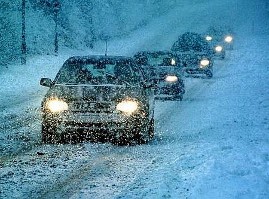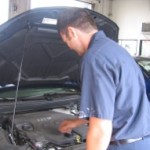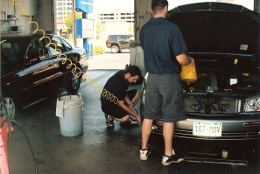 Well, here it is, the snow has finally arrived! It seems like it has taken its time this year, especially for anybody that enjoys participating in winter sports. And since the snow has come, it brings with it the task of car winterizing. Even though you’ve probably heard it all before, it is a task you don’t want to ignore. Modern technology has simplified car winterizing so it isn’t as difficult as it once was, so there is no excuse for not getting it done.
Well, here it is, the snow has finally arrived! It seems like it has taken its time this year, especially for anybody that enjoys participating in winter sports. And since the snow has come, it brings with it the task of car winterizing. Even though you’ve probably heard it all before, it is a task you don’t want to ignore. Modern technology has simplified car winterizing so it isn’t as difficult as it once was, so there is no excuse for not getting it done.
Take your car in and have it serviced. The oil in your engine needs to be changed on a regular basis in order to keep your car running smoothly, so if you haven’t had an oil change recently, now is the time.
Car winterizing also involves your cooling system. Now is a good time to have it flushed out. Your car’s cooling system not only keeps the engine from overheating in the summer but also from freezing in the winter. It’s very important to flush the system and have the old coolant replaced with fresh coolant.
Your battery cables, terminals and fluid should be thoroughly inspected for damage or wear. It also should be checked to make sure it is able to hold a charge in the colder weather. If your battery is more than four years old, you should seriously consider replacing it as a part of the car winterizing process.
Replacing your windshield wiper blades with snow blades and making sure you have enough windshield washer fluid ( not plain water) in the windshield washer reservoir is also important.
Checking your tires to make sure they are in good condition for the winter weather should be part of your checklist. You may want to consider using snow tires during the winter months. They do a much better job than an all-weather tire in the snow.
One of the most important tasks of car winterizing is having your brakes checked! There isn’t anything more frightening than not being able to stop in the snow when you push on the brake! If your brakes haven’t been checked out in the last six months, now is a perfect time to have them checked.
Well, that covers the most important tasks in car winterizing, but there are a few smaller details you might want to include, like an emergency kit for your car that includes a blanket, gloves, ice scraper, a small shovel, flashlight and sand or kitty litter, (for traction). And check the lights, heater and defroster to make sure they are all working properly. Also keep your gas tank as full as possible to prevent moisture from freezing in the gas lines.
For any of these services or any of your Denver Auto Repair needs, trust Express Car Care. Call (303) 691-2760 or stop by our shop today.








 A question we often hear at our shop is “why is my check engine light flashing?” There is not always a simple and quick answer to this question.
A question we often hear at our shop is “why is my check engine light flashing?” There is not always a simple and quick answer to this question.
